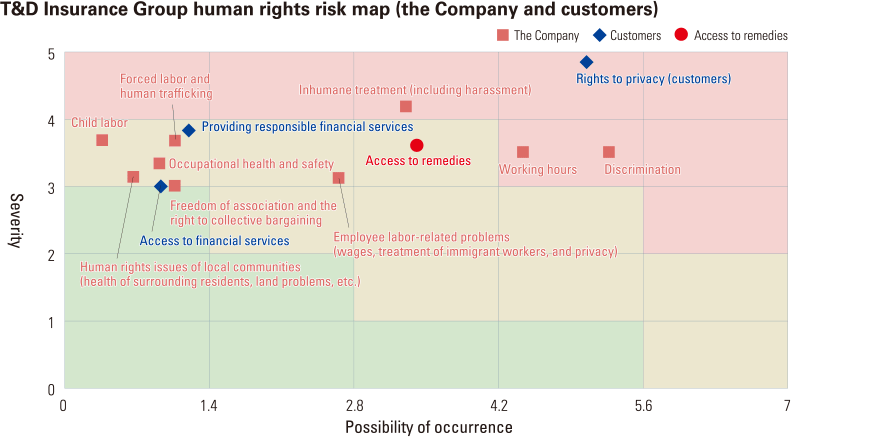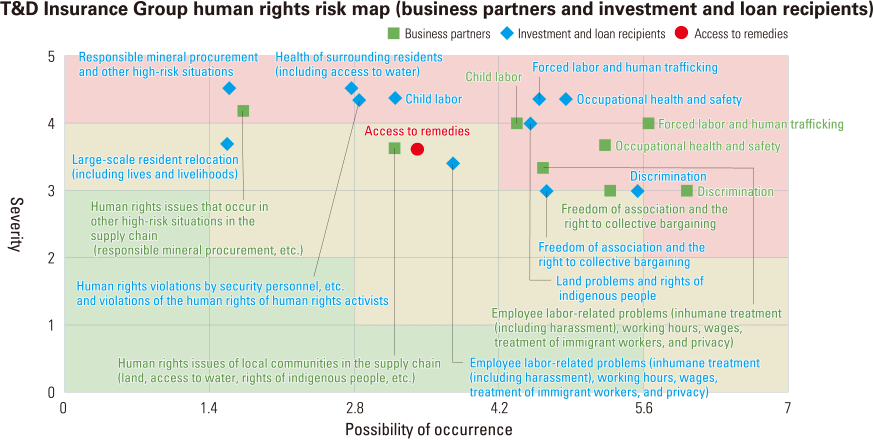The T&D Insurance Group has established this Human Rights Policy (the Policy) as a set of standards applicable to all executives and employees*, based on the Group's Corporate Philosophy and the T&D Insurance Group Sustainability Charter. We recognize that our business activities could potentially have human rights impacts. We are committed to conducting our business activities with respect for the human rights of all stakeholders in line with this Policy.
We expect all our business partners to understand and adhere to this Policy. We also strive to use our leverage to contribute to a society where all people’s human rights are respected.
1. Our Position on Respect for Human Rights
We aim to be a group that contributes to all people and society through creating value, and fulfill our responsibility to respect human rights of all stakeholders related to our business activities. We commit to respecting internationally recognized human rights as set out in the International Bill of Human Rights*1 and the International Labour Organization’s Declaration on Fundamental Principles and Rights at Work*2. We support the United Nations Guiding Principles on Business and Human Rights*3, and as a signatory to the United Nations Global Compact, we also commit to implement their Ten Principles*4.
Where national laws and international human rights standards differ, we will follow the higher standard. Where they are in conflict, we will seek ways to respect internationally recognized human rights while still complying with applicable local laws.
2. Implementation of Human Rights Due Diligence
We commit to implement human rights due diligence to identify, prevent and mitigate adverse human rights impacts associated with our business activities. We strive to deliver appropriate remedial measures when we discover that we have caused or contributed to adverse human rights impacts.
We strive to engage and consult with relevant stakeholders to appropriately understand and address our business activities’ impact on human rights.
3. Training and Raising Awareness
We will provide training on respect for human rights to all executives and employees to raise awareness and to build capacity to effectively implement this Policy.
4. Grievance Mechanisms
We have whistle blowing channels through which concerns and grievances related to human rights can be raised, which are accessible to all our executives and employees. We also have mechanisms through which human rights concerns and grievances associated with our business can be raised by external stakeholders, such as customer desks of the head offices and branch offices, call centers (customer service centers) and online reporting channels. We continue to optimize our grievance procedures in order to respond to internal and external concerns and grievances associated with our human rights impacts.
5. Reporting on Our Progress to Respect Human Rights
We will continuously report progress on our efforts to respect human rights through our website, Sustainability Report and other communication channels.
*The term “all executives and employees” includes employees across all employment forms, including contract employees, part-time employees, in addition to full-time employees.
July 1, 2020
Approved by T&D Holdings Board of Directors
*1. International Bill of Human Rights consists of the Universal Declaration of Human Rights and the main instruments through which it has been codified: the International Covenant on Civil and Political Rights and the International Covenant on Economic, Social and Cultural Rights.
*2. The ILO Declaration on Fundamental Principles and Rights at Work sets five categories as a minimum standard to be observed in relation to labor: “freedom of association and the effective recognition of the right to collective bargaining,” “the elimination of forced or compulsory labour,” “the abolition of child labour,” “the elimination of discrimination in respect of employment and occupation,” and “a safe and healthy working environment.”
*3. The United Nations Guiding Principles on Business and Human Rights, endorsed by the United Nations Human Rights Council, provide the authoritative global standard for action related to human rights in a business context, clarifying what is expected by governments and companies to address adverse impacts on human rights arising from business activity.
*4. Ten Principles on human rights, labour, environment and anti-corruption. The principles of Human Rights and Labour include: (1) support and respect the protection of internationally proclaimed human rights; (2) non-complicity in human rights abuses; (3) recognition of freedom of association and the right to collective bargaining; (4) elimination of forced and compulsory labour; (5) effective abolition of child labour; and (6) elimination of discrimination in respect of employment and occupation.
Human Rights Due Diligence
Based on the T&D Insurance Group Human Rights Policy, the Group implements human rights due diligence to identify any negative effects that its business activities have or could potentially have on human rights and to prevent or mitigate such effects.
| STEP1 | ■Commitment ・The Group has established the T&D Insurance Group Human Rights Policy, which clearly states that the Group respects internationally recognized human rights norms and implements human rights due diligence. |
|---|---|
| STEP2 | ■Formulation of the process ・Establish the items for confirmation in human rights due diligence. ・Establish particularly important human rights risks as items for priority confirmation. |
| STEP3 | ■Human rights assessment ・Assess the effects of items for confirmation on formulated important human rights risks. ・Investigate the status of occurrence of human rights issues within the Group. |
| STEP4 | ■Implementation of human rights risk mitigation measures and countermeasures ・If human rights issues are identified by human rights due diligence, the Group will formulate and execute prevention/mitigation measures and remedial measures for the relevant human rights risks. |
* Recently, STEP 2 Formulation of the process and STEP 3 Human rights assessment have been implemented as human rights due diligence covering the period up to March 31, 2024.
(1) Identification of human rights risks
The Group refers to major international norms related to human rights and obtains the knowledge of experts as we identify and assess potential effects on and risks related to respecting human rights in terms of our business activities.


* Here, access to remedies refers not to risks resulting from the occurrence of issues but rather to risks resulting from the inability to rectify or remedy negative effects due to a lack of access. Because the properties of such risks differ from those of other issues, we assess them by using the method below.
Severity:
Because the severity due to the inability to access remedial measures is the same as the severity of each human rights issue that caused the need for such measures, to calculate the severity, we weight the field severity of every issue/field according to its possibility of occurrence and then find the total.
Possibility of occurrence:
The value calculated by assessing and weighting the Group’s situation in terms of (1) the Company’s workers, (2) customers, (3) business partners’ workers, (4) investment and loan recipients’ workers, and (5) local communities (local communities in each area).
(2) Implementation of human rights due diligence and confirmation results
The Group exercised human rights due diligence at the Company and its consolidated subsidiaries covering the period up to March 31, 2024.
During our due diligence, we comprehensively confirmed human rights problems, including the development status of our human rights awareness-raising promotion system, the situation of any actions taken to prevent discrimination against workers in the workplace, and the confirmation situation of any human rights problems that should be considered in the supply chain or for investment and loan recipients. Based on the T&D Insurance Group Human Rights Risk Map that was formulated in fiscal 2023, we recently added “customers’ rights to privacy” to the items we check and confirmed related systems, the status of emerging human rights risks, and other matters.
In our assessment, we focused on our own risks in relation to “harassment” and “long working hours,” which are particularly important human rights risks for us. As a result of this human rights due diligence, we have confirmed that no serious human rights issues requiring correction have arisen in the Group’s business activities. In addition, we also confirmed that problems have generally not arisen regarding the status of consideration for human rights in our business activities in Myanmar.
Human rights management structure (human rights due diligence)

*1 Due diligence results are also coordinated with the Group Compliance Committee
*2 The results of each company’s due diligence are reported to the board of directors of each company as appropriate
Additional item: rights to privacy (customers)
We confirmed that each company has established systems to protect the right to privacy, and verified that the necessary measures are being implemented in case of the leaking of personal information.
Items for priority confirmation: Harassment
The number of cases of harassment in fiscal 2023 is shown below.
The Group handles reports and consultations related to harassment (sexual, power and other harassment) via the T&D Insurance Group Helpline—which was established as an internal reporting system—as well as Harassment Consultation Desks established at the three life insurance companies, etc.
The Group Helpline and Harassment Consultation Desks also deal with whistleblowing reports and consultations from employees about human rights related issues including harassment, and work to provide remedy to victims and prevent recurrence. If our investigations uncover violations of laws and regulations or internal rules, we take measures to provide remedy to victims, including reshuffling personnel, and we also take disciplinary action in accordance with the work rules.
Harassment occurrence situation (fiscal 2023)
| Number of confirmed targets | ||
|---|---|---|
| Number of harassment-related consultations received* | 70 | |
| Number of incidents certified as harassment | 10 | |
* Total from all reception desks
Items for priority confirmation: Excessive working hours
While no serious human rights issues due to long working hours have occurred, some managers have been working in excess of 80 hours overtime per month. To prevent excessive working hours, the Group promotes initiatives in line with the situation of each company.
Over 80 hours per month of non-statutory work
| Fiscal 2021 | Fiscal 2022 | Fiscal 2023 | |
|---|---|---|---|
| Non-statutory work of over 80 hours per month | 20 people | 18 people | 20 people |
* T&D Holdings and seven directly owned subsidiaries
Main initiatives to limit excessive working hours
・Implementing measures that include No Overtime Day/Go Home Early Day, automatically shutting down computers used for work, and a work interval system
・End-of-month overtime simulations to alert both employees who are likely to work excessive hours and their supervisors
・Providing labor management training for managers
Going forward, we will continue to exercise human rights due diligence in order to verify the status of the Group’s response to human rights issues, confirm whether there are any issues, and report the results to the Group Sustainability Promotion Committee on an annual basis. The contents of reports to the committee will be reported to the Board of Directors of T&D Holdings and used to facilitate collaboration with the Group Compliance Committee. If human rights issues are identified during human rights due diligence, we will take measures to resolve them.
(3) Human rights education sessions
The T&D Insurance Group brings in outside instructors for Group Manager Human Rights Seminars, and conducts human rights awareness-raising training at each Group company incorporating themes on a range of issues associated with human rights, including various forms of harassment, and diversity.
These activities reflect our commitment to providing employees with a deeper understanding of human rights.






